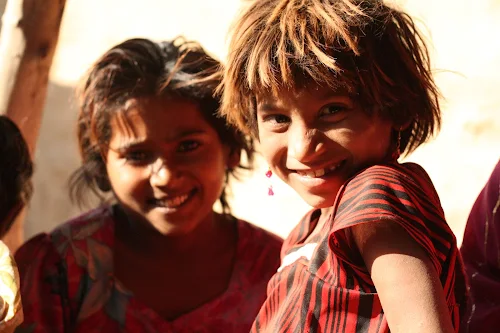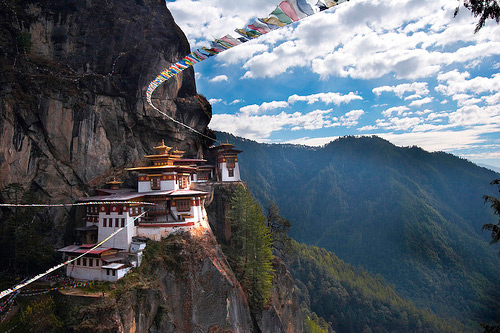 |
| The Okey Cokey! |
We were lucky enough to find Pabu Ki Dhani (PKD) online, translated as Pabu's Little Village, in a list of attractions near Jaisalmer. Both of us felt the need to get off the beaten Lonely Planet track and this looked like it would deliver.
PKD is run by Pabu and Capucine - Pabu is from the Bil tribe, a low-caste desert community, and Capucine from Paris. They met 7 years ago in the desert when Pabu was Capucine's camel guide, fell in love and have started a small charity to support Pabu's community.
They've bought a plot of land in the middle of the desert and built some traditional mud huts to provide accommodation for tourists. And adjacent to that is their house. It's incredibly peaceful and feels so remote. There was just us and an older French couple when we were there.
 |
| PKD at sunset |
Staying in the house were Pabu and Capucine and 5 children, 2 from Pabu's previous relationship plus one of their own and a couple of cousins. Lovely children who had built the most amazing camp where Duncan I enjoyed playing with them and singing the Okey Cokey! There was also Pabu's 2 brothers, his cousin and a couple of other men who were friends. It was a bit like a commune!
 |
| Camp! Much better than two chairs with a blanket slung over the back. |
 |
| 1, 2, 3, jump! |
The pace was relaxed to say the least and we spent hours just chatting, talking about life and the hardship of living in the desert as part of a low-caste community and about Pabu & Capucine's unique story.
As part of staying there you are offered camel safaris or visits to local villages. We'd had enough time on camels to last us a while so opted for the village visits. A chance to see local artisans and village life really appealed and didn't disappoint. Pabu & Capucine explained that they had spent lots of time and energy convincing villagers to reignite artisan crafts which were being lost in exchange for slightly better paid work as stone breakers. We met a potter, who made beautiful water pots, and a weaver, who made colourful carpets. They now make a good living from the revival of theses crafts. Pabu & Capucine admitted that to begin with they were the sole purchasers of all their goods but, once word spread, other villagers began to buy.
 |
| The potter |
 |
| Water pots |
 |
| The weaver |
We also visited the seven sisters hindu temple which confounded our disillusion towards organised religion. The temple comprised of 3 areas in which to pray. Rajputs (high caste) had their own large shrine, a quaint building with lots of artefacts and deities inside, and its own caretaker. Then about 10 metres away was a much smaller outhouse, very basic with a small shrine, where Bils and other low-caste people go to pray. A few metres from that was a 3rd area of prayer, open to the elements with scores of small relics portraying the seven sisters for the Dalit caste, described as gypsies by our guide, the lowest caste of all. Much to our distaste, it was explained that dependent on your caste you were forbidden to worship at each shrine. You could only pray at your own. We were flabbergasted.
 |
| Yamuna, Mina and Aru at Seven Sisters Temple where Bil could worship |
The mistrust and dislike between one caste and another was a running theme throughout the time we spent at PKD. It was a real eye opener, and gave us a much greater understanding of the woes of the world. The hatred for ones neighbour just because they are a different caste seemed to be ingrained into all from a young age. We were both very embarrassed when at one point Pabu made the boys in the village split into two groups, Rajput and Bil, to show us who was who. He then whispered that we should be careful with our belongings around the Rajput boys! I'd actually eat my hat if any one of these cute little village boys, Rajput or Bil, would ever steal from us. We spent ages with them taking photos, playing catch with a cricket ball - they were all just innocent, fun, giggly kids. Sadly they will probably grow up with the prejudices of their parents instilled.
 |
| Pabu's cousin and his kids |
Pabu's younger brother, Ganpad, had his own story. In an attempt to break with tradition and get a decent education, Ganpad (with help from Pabu and Capucine) wanted to enrol in a school in Jaisalmer, but they came up against real resistance. Ganpad was a lovely guy, obviously bright and enthusiastic about his studies but it hadn't been easy getting him into school, quite simply because he was Bil. They had to pay double to start with but even then he was ostracised, made to sit outside, literally in the courtyard where he could only see the classroom and blackboard through a window and scarcely hear what was being taught. Nevertheless he passed all his exams helped by a kind hearted teacher who gave him classes outside school hours. Shocking for us, normal here. Makes you realise how lucky you are.
 |
| Ganpad playing the morchang around the campfire. |
The following day we visited more villages and I got made up by the local girls! They painted henna designs on both my hands and feet and put Indian style make-up on me. We had a great time and although we could hardly communicate their smiles and enjoyment were unforgettable. Duncan was privy to a private sitar performance while all this was going on which he loved.
 |
| My lovely make-up artists. |
 |
| The sitar player |
Evenings were spent traditionally around the Campfire, the men sang and played the
morchang, a small metal instrument like no other we'd ever seen with a lovely sound. Duncan fell in love with it and on our return to Jaisalmer, Pabu took us to a morchang maker's home where we purchased two, drank chai and I made friends with the ladies of the house.
Here's a link to a video of Pabu playing the morchang. |
| Pabu testing out the morchang that Duncan went on to buy. |
All in all it was a unique experience. Warm friendly people living in tough circumstances. Circumstances unimagineable in our world. It was an unforgettable couple of days.
Cute kid photos alert...



























